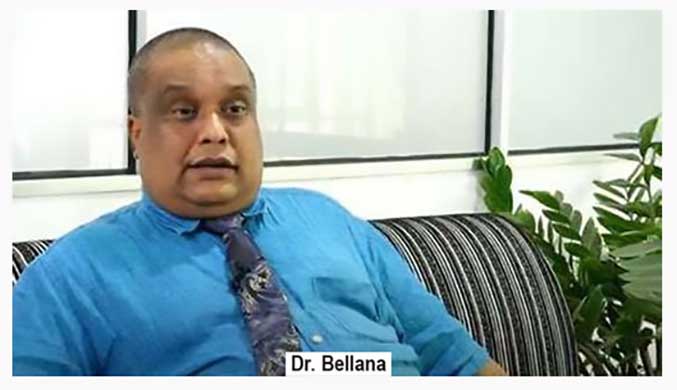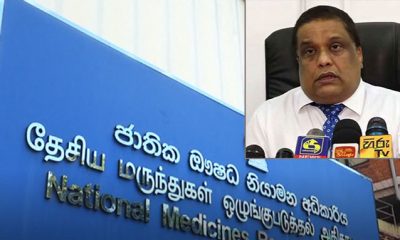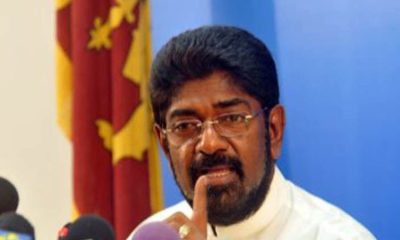News
GMOF: A robust private hospital network needed to augment health service

By Shamindra Ferdinando
President of the Government Medical Officers Forum (GMOF) Dr. Rukshan Bellana says Sri Lanka needs a well-equipped private sector hospital network to augment the state health sector.Declaring the expansion of private hospitals and related facilities should be a priority for any sensible government, Dr. Bellana, who is also the Deputy Director of the National Hospital, emphasized the urgent need for a regulatory system to ensure proper management of private hospitals’ networks and other health services.
In the absence of an efficient regulatory mechanism, private hospitals fleeced communities, the former GMOA (Government Medical Officers’ Association) executive committee member alleged, while questioning the failure on the part of successive governments to address the issue. The Wickremesinghe-Rajapaksa government is no exception, he said. Bellana served as the GMOA Assistant Secretary during the 2000-2003 period.
Had there been a proper pricing mechanism, more people would have sought treatment at private hospitals, thereby lessening the burden on the government, the outspoken trade unionist said, responding to The Island queries that focused on the deterioration of the healthcare system. Dr. Bellana also functioned as the GMOA spokesperson in 2003.
Dr. Bellana said that the health sector crisis couldn’t be discussed or addressed in isolation. “We have to take into consideration Sri Lanka’s bankruptcy status, as well as continuing waste, corruption, irregularities and mismanagement, associated with the public health sector.” Widespread corruption accusations pertaining to medicine procured in terms of the USD 1 bn Indian credit line, received before the change of the government, last July, underscored the pathetic state of affairs.
The health administration should be ashamed of its failure at least to meet the basic requirements of those struggling to make ends meet, Dr. Bellana said, urging the Parliament to look into the catastrophic situation in the health sector.
Responding to another query, he said that Sri Lanka should establish at least one hospital, similar to that of Mount Elizabeth Hospital, in Singapore, to attract foreign patients. Pointing out that Sri Lanka had human resources to operate such a hospital, Dr. Bellana said that it would be definitely a worthwhile investment. Those who opposed further expansion of the network of private hospitals and demanded 100 percent free public sector health service never wanted to sensibly address the growing challenges in the health sector, Dr. Bellana alleged.
Successive governments, politicians and various interested parties repeated Prof. Senaka Bibile’s government managed procurement of pharmaceutical products policy like a mantra for their advantage, the GMOF President alleged. The National Medicines Regulatory Authority (NMRA) should be probed by the Commission to Investigate Allegations of Bribery or Corruption (CIABOC), Dr. Bellana said, urging the government to take tangible measures to restore public confidence in the regulatory body.
“Of course, that wouldn’t be an easy task as public confidence in almost all key institutions, including Parliament, has deteriorated over the years,” Dr. Bellana said. But, re-thinking of overall strategy was of paramount importance as Sri Lanka could no longer follow Prof. Bibile’s policy, Dr. Bellana said, declaring that the procurement process needed to be liberalized for the benefit of all. According to Dr. Bellana, in the current situation Prof. Bibile’s policy, or strategy, whatever one chose to call it, was irrelevant, the trade unionist said. “Let us comprehend the challenges and take required measures to overcome them. Unfortunately, we are playing politics with key sectors. Health is not an exception,” Dr. Bellana said.
The Federation of Teachers’ Associations’ (FUTA) refusal to evaluate GCE Advanced Level answer scripts for two months over the government’s tax package is a case in point, Dr. Bellana said. How FUTA could be so irresponsible, Dr. Bellana asked, also alleging other trade unions, representing professionals, of pursuing agendas. It would be a grave mistake on the part of relevant professional groups to look at problems only through their point of view. Disruption caused by FUTA underscored the need to be cautious in resorting to trade union action. Dr. Bellana appreciated the FUTA calling off strike in the wake of mounting pressure on them. Asked whether he was serious about declaring the doctors’ competence in replacing FUTA in the answer script evaluation process, Dr. Bellana said that a group of politically motivated people couldn’t be allowed to hold the student community to ransom.
Dr. Bellana said that having formed the GMOF in 2010, he received formal recognition four years later. Asked whether he was satisfied with the progress made, he pointed out that the public lacked awareness and it was not easy at all to convince them of how successive governments deceived them. The hospital administrator said that the vast majority of Sri Lankans in spite of being left oriented actually were rightist. They expected results overnight, Dr. Bellana said, pointing out that corrupt political parties, and trade unions affiliated to them, propagated free education and free health to deceive the public. Relief provided by the government at the expense of taxpayers’, too, contributed to the current crisis, Dr. Bellana said.
Sri Lanka, he said, needed to review its policies without further delay or prepare to face the consequences. He insisted that what the country required was a comprehensive social security network to provide assistance to the needy.
An irate Dr. Bellana said that perhaps one catastrophic result was the entry of 134 lawmakers, without GCE Ordinary Level, and 94, without GCE Advanced Level, to Parliament.
Dr. Bellana also questioned the role played by the executive in the deterioration of the country at every level. The politically motivated use of Prof. Bibile’s policy, over the years, ruined the medical supply chain as it couldn’t be applicable in the current context, Dr. Bellana said, urging political parties represented in Parliament to reach consensus on Sri Lanka’s path. “We have to decide on a course of action. Do we follow Russia and China or Singapore, South Korea and Malaysia?”
Commenting on the current state of the health sector, the maverick trade unionist said that the system was corrupt and undependable and the country couldn’t expect improvement in the near future. The exploitation of foreign tours indicated how, over the years, politicians, and top officials, and their associates, corrupted the entire system. Claiming that Director General of Health Services (DGHS) Dr. Asela Gunawardena had left the country, on six occasions so far this year, Dr. Bellana asked whether the Director General, WHO, had travelled so much, even though he served the whole world.
Dr. Bellana alleged that those aged senior officials, at key positions, should give an opportunity to young officials at the Ministry and doctors who served in rural areas. Dr. Bellana asserted that the country couldn’t benefit by repeatedly sending the aged for overseas assignments as they didn’t contribute to the improvement of health services, at all.
The free health service was nothing but propaganda as the country couldn’t allocate the required funds to maintain free health services, Dr. Bellana said, pointing out that since 2020/2021 the situation has deteriorated to such an extent, the overall services were crumbling, rapidly. “Can we continue to live in a lie?” he asked. Unfortunately, the vast majority of the population is gullible, political parties exploit them to the hilt, Dr. Bellana said, adding that continuing failure on the part of State revenue collection mechanism, to achieve targets, highlight the absurdity of the situation. “On one hand taxes are introduced whereas those who have been taxed, side step the taxman. If one bothers to peruse reports, issued by parliamentary watchdogs, over the years, the culprits can be easily identified.”
Dr. Bellana repeated his previous accusations against former GMOA Chief Dr. Anuruddha Padeniya over influencing the government, particularly in respect of the agriculture policy. There was no point in denying the fact the overnight ban on chemical fertilisers, in April/May 2021, delivered a devastating blow to the agriculture sector, Dr. Bellana said, comparing Dr. Padeniya’s strategy with that of FUTA.
Dr. Bellana said that FUTA exposed itself badly when it campaigned for allocation of six percent of GDP for education, in the run-up to the 2015 presidential election. Declaring the FUTA was on an international contract, Dr. Bellana alleged that a section of FUTA served the interests of various local and foreign sponsors, regardless of consequences.
News
US sports envoys to Lanka to champion youth development

The U.S. Embassy in Colombo welcomed the U.S. Sports Envoys to Sri Lanka, former National Basketball Association (NBA) and Women’s National Basketball Association (WNBA) players Stephen Howard and Astou Ndiaye, from June 8 through 14.
The Public Diplomacy section of the U.S. Embassy said that it would launch a weeklong basketball program intended to harness the unifying power of sports, made possible through collaboration with Foundation of Goodness and IImpact Hoop Lab.
While in Sri Lanka, Howard and Ndiaye, both retired professional basketball players, will conduct a weeklong program, Hoops for Hope: Bridging Borders through Basketball. The Sports Envoys will lead basketball clinics and exhibition matches and engage in leadership sessions in Colombo and Southern Province for youth aged 14-18 from Northern, Uva, Eastern and Western Provinces, offering skills and leadership training both on and off the court. The U.S. Envoys will also share their expertise with the Sri Lanka Basketball Federation, national coaches, and players, furthering the development of basketball in the country. Beyond the clinics, they will collaborate with Sri Lankan schoolchildren to take part in a community service project in the Colombo area.
“We are so proud to welcome Stephen and Astou as our Sports Envoys to Sri Lanka, to build on the strong people-to-people connections between the United States and Sri Lanka,” said U.S. Ambassador Julie Chung. “The lessons that will be shared by our Sports Envoys – communication, teamwork, resilience, inclusion, and conflict resolution – are essential for leadership development, community building, equality, and peace. The U.S. Sports Envoy program is a testament to our belief that sports can be a powerful tool in promoting peace and unity.”
News
Rahuman questions sudden cancellation of leave of CEB employees

SJB Colombo District MP Mujibur Rahuman in parliament demanded to know from the government the reasons for CEB suspending the leave of all its employees until further notice from Thursday.
MP Rahuman said that the CEB has got an acting General Manager anew and the latter yesterday morning issued a circular suspending leave of all CEB employees with immediate effect until further notice.
“We demand that Minister Kanchana Wijesekera should explain this to the House. This circular was issued while this debate on the new Electricity Amendment Bill was pending. There are many who oppose this Bill. The Minister must tell parliament the reason for the urge to cancel the leave of CEB employees,” the MP said.However, Speaker Mahinda Yapa Abeywardena prevented Minister Wijesekera responding to the query and said that the matter raised by MP Rahuman was not relevant.
News
CIPM successfully concludes 8th Annual Symposium

The Chartered Institute of Personnel Management (CIPM) successfully concluded the 8th Annual CIPM Symposium, which took place on 31st May 2024. Themed “Nurturing the Human Element—Redefining HRM in a Rapidly Changing World,” the symposium underscored the pivotal role of human resource management (HRM) in today’s dynamic global landscape. Since its inception in 1959, CIPM has been dedicated to advancing the HR profession through education, professional development, and advocacy, solidifying its position as Sri Lanka’s leading professional body for HRM.
Ken Vijayakumar, the President of the CIPM, graced the occasion as the chief guest. The symposium commenced with the welcome address by the Chairperson, Prof. Arosha Adikaram, followed by the Web Launch of the Symposium Proceedings and Abstract Book by the CIPM President. The event featured distinguished addresses, including a speech by Chief Guest Ken Vijayakumar, President of CIPM, and an address by Guest of Honor Shakthi Ranatunga, Chief Operating Officer of MAS Holdings Pvt. Ltd., Sri Lanka.
The symposium also featured an inspiring keynote address by Prof. Mario Fernando, Professor of Management and Director of the Centre for Cross Cultural Management (CCCM) at the University of Wollongong, Australia.
Vote of Thanks of the inauguration session was delivered by Dr. Dillanjani Weeratunga, Symposium Co-chair.
The symposium served as a comprehensive platform for researchers to present their findings across a wide range of critical topics in HRM. These included Cultural Diversity and Inclusion, Talent Development and Retention, Ethical Leadership and Corporate Social Responsibility, Adapting to Technological Advancements, Mental Health and Well-being at Work, Global Workforce Challenges, Employee Empowerment, and Reskilling and Upskilling.
The plenary session was led by Prof. Wasantha Rajapakse. Certificates were awarded to the best paper presenters during the valedictory session, followed by a vote of thanks delivered by Kamani Perera, Manager of Research and Development.
The annual symposium of CIPM was a truly inclusive event, attracting a diverse audience that spanned undergraduates, graduates, working professionals, research scholars and lecturers. This widespread interest highlights the symposium’s significance in the field of HRM, offering a unique opportunity for everyone to network and learn from scholarly brains.The CIPM International Research Symposium was sponsored by Hambantota International Port, Sri Lanka Institute of Information Technology (SLIIT), E B Creasy & Co. PLC, and Print Xcel Company.


















